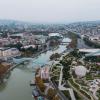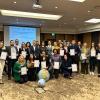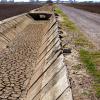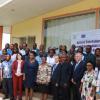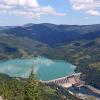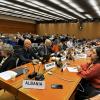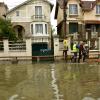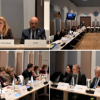News
Displaying Results 26 - 50 of 153
Following the decision of Parties to the UNECE Convention on Long-range Transboundary Air Pollution (Air Convention) to revise the Protocol to Abate Acidification, Eutrophication and Ground-Level Ozone (Gothenburg Protocol), which is expected to further strengthen efforts to reduce air pollution in…
Air pollution levels in Georgia are considered unhealthy with annual average of fine particles PM2.5 exceeding the World Health Organization's air quality guideline by at least three times.
To support Georgia in further improving its air quality management system, a new EU-funded project,…
Mapping air pollutant emission sources of a given country can help experts and decision-makers understand which policies are most viable. Spatial allocations of emissions are also important to understand where emissions are coming from on a regional level.
Spatially allocating – or gridding –…
Guaranteeing safe access to drinking water and sanitation remains a challenge in the pan-European region, with 16 million people still lacking access to basic drinking water services and over 29 million people not having access to basic sanitation, including hundreds of thousands who have to…
Around 3.6 billion people live in contexts that are highly vulnerable to climate change and many of them are in transboundary basins. Droughts do not recognize borders, pose transboundary risks, and require cooperation to address them. The 6th IPCC assessment (2022) and the IPCC synthesis (2023)…
The impact of different air pollutants on vegetation and crops has been studied for over 35 years in the framework of the UNECE Convention on Long-range Transboundary Air Pollution, through its International Cooperative Programme on Effects of Air Pollution on Natural Vegetation and Crops (ICP…
Ensuring the principles of environmental democracy are upheld in relation to modified organisms/genetically modified organisms (LMOs/GMOs) can help countries to address biodiversity loss and support progress on a number of Sustainable Development Goals, in particular Goals 2 (zero hunger), 15 (life…
Sierra Leone shares four major rivers with the neighbouring countries of Guinea and Liberia, including the Great Scarcies, Little Scarcies and Moa shared with Guinea, and Mano River shared with Liberia. All provide crucial freshwater that sustains ecosystems, livelihoods and the well-being of…
Burkina Faso is one of the Sahelian countries hardest hit by the effects of climate change, experiencing torrential rains and floods, as well as periods of insufficient rainfall.
To help address these challenges, through adaptation, resilience and concerted, shared management of its water…
Originally introduced in policy and development discussions in 2011, the water-food-energy-ecosystem nexus approach has evolved into a pivotal framework for sustainable development and achieving the Sustainable Development Goals (SDGs).
Work on the water-energy-food-ecosystems nexus under the…
Cooperation and management of transboundary waters, which span over 45% of the world's surface and serve as vital resources for nearly half of the global population, face the imminent threat of underfunding. The last reporting exercise on Sustainable Development Goals (SDG) indicator 6.5.2 (2020),…
According to a recently published UNECE Policy Paper, the agrifood, the garment and footwear and the mineral sectors contribute significantly to the economic growth and employment in the UNECE region, while being major sources of global greenhouse gases (GHG) and environmental pollution. Evidence…
The Protocol on Pollutant Release and Transfer Registers (Protocol on PRTRs) sets international standards for reporting on pollutant releases from a range of economic activities, such as mineral industry operations, plastic production, waste and wastewater management or the rearing of poultry or…
Transparency in the environmental performance of economic activities and effective public access to environmental information, especially on products, are indispensable in addressing pressing environmental challenges. This also supports a just transition towards a green and circular economy,…
The Mediterranean Region, home to over 510 million people, is an important crossroads for economic, social and cultural exchanges between Europe, Africa, Asia and other continents. The region is rich in biodiversity, but has come under pressure due to the intensive exploitation of mineral resources…
In the UNECE region, the Fourth Cycle of Environmental Performance Reviews (EPR) kicks off with the review of Tajikistan, carried out for the fourth time under the leadership of UNECE.
A large, multidisciplinary team of international experts worked in Dushanbe from 6 to 15 November 2023,…
The European Commission has proposed a new legislation, the European Critical Raw Materials Act, to ensure a secure and sustainable supply of critical raw materials for the EU. The Act, on which the European Parliament and the European Council reached a provisional agreement on 13 November,…
In the pan-European region, citizens are feeling the impacts of climate change through extreme weather events. This undermines equitable access to water and sanitation as human rights, due to increasing water scarcity and increased burden of water diseases due to overflow of untreated sewerage…
Policy solutions for pressing problems like air pollution require sound data. Emission inventories can help in determining the major sources of air pollution in a given country.
As a result of integrated air pollution management strategies developed under the UNECE Convention on Long-range…
Global goals – just like regional and national goals — can only be achieved if we work together. This is a reason that revitalizing partnerships is at the heart of the Sustainable Development Goals (SDGs).
With this in mind, under the umbrella of the Regional Collaborative Platform, regional…
Transboundary rivers, lakes, and aquifers play a vital role in supporting the livelihoods of billions of people worldwide. Roughly 60% of global freshwater flow is in shared basins. About 40% of the world’s population lives in shared basins. The development and management of transboundary water…
Understanding how pollutant emissions will evolve in the future is essential for designing effective clean air policies today while taking into account the available resources in a given country.
While air quality in the UNECE region has improved over the past few decades as a result of…
Almost all of Botswana’s territory sits within transboundary rivers basins. Although landlocked, Botswana is therefore a ‘water-linked’ country. The Cubango-Okavango, Limpopo, Orange-Senqu and Zambezi Rivers all provide crucial freshwater arteries that supply people and nature, including the…
An estimated 3.6 billion people face inadequate access to water at least a month per year – a figure expected to increase to more than 5 billion by 2050. According to WMO, over 50% of global catchment areas and reservoirs displayed deviations from normal conditions in 2022, of which the majority…
Every year, forest fires set new records. The 2023 wildfire season in the Northern Hemisphere could not have been worse.
The wildfire that ravaged northeastern Greece in August was the largest single wildfire recorded in the European Union (EU), burning more than 810 square kilometres.
In the…


